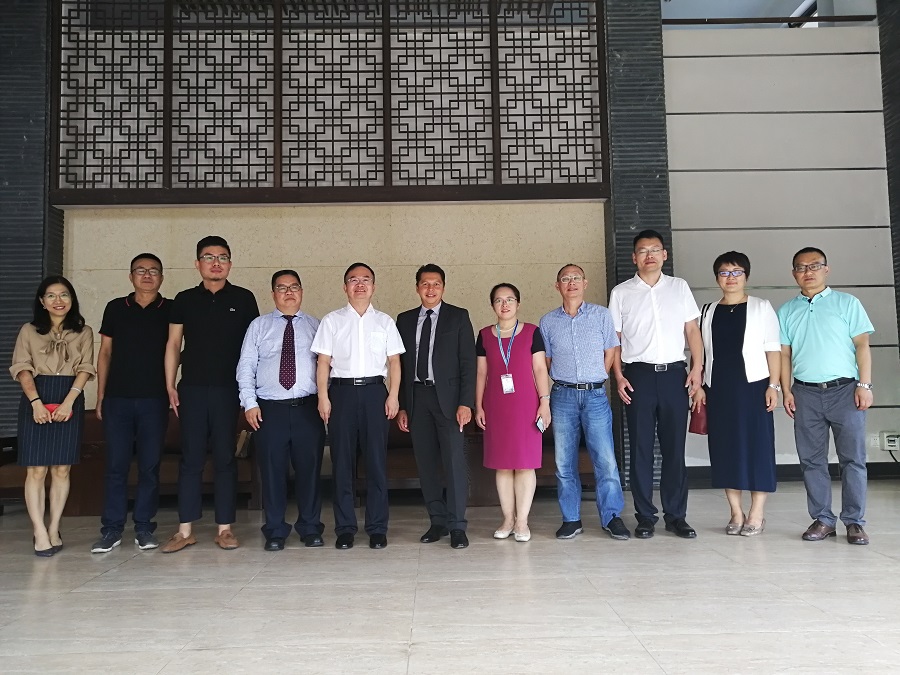
The Guests of Clermont Business School in France Visited GZCC
On the afternoon of 15th October, the Vice Principal of Clermont Business School in France, Richard Soparnot, General Representative in China and General Manager of Yujia Education, Xiang Xiaoguang, Visiting Professor and General Consultant of the 3 + 2 project, Tang Kai, and his party visited our school for an academic exchange. The Principle of our school, Huang Chen, Vice Principle, Ou Jiemei, the Dean of the School of Economics, Chen Shiqing, Dean of the School of Management, Huang Lijun, Dean of the International College, Guo Hang, Vice Dean of the International College, Long Haiying, Vice Dean of the School of Accounting, Chen Deyu, and the teacher Zhang Jianxiu and his party welcomed Richard Soparnot in the room 202 conference room and held a sympnosium. The meeting was chaired by Guo Hang.
On behalf of the school, Ou Jiemei welcomed Richard Soparnot and his party. She introduced the overall situation of our school and the future plan of the International College. She said that previous cooperation was mainly in the fields of economics and management. She hoped that the future cooperation could be extended to information technology, art design, law and nursing home economics. She hoped that the education could be expanded from undergraduate to diploma, foundation program and postgraduate. She proposed to introduce exchange program and study tours. She hoped that both sides could work together to start programs to provide students and teachers with more learning opportunities to increase the influence of Guangzhou college of commerce.
Huang Tao pointed out that in order to make Guangzhou college of commerce more international, it is necessary to provide multi lingual, multi professional and multi-mode cooperation, provide more opportunities for students to study aboard, and increase the rate of students pursuing a post-graduate degree. At the same time, do not limit the cooperation to degree only. It can be expanded to other means such as exchange program, study tours, teacher training program, etc.By introducing overseas high-quality teaching resources, we can improve the quality of our school.
Richard Soparnot thanked our school for the warm welcome and supported the cooperation between Clermont business school and Guangzhou college of commerce. He hoped that our school would visit Clermont business school one day. Principle Richard introduced that Clermont business school was founded in 1919 by the chamber of Commerce, which is state-owned but run by the private sector, and its shareholders are the chamber of Commerce, the government and enterprises.Located in the center of Ferrand which is 3 hours' drive from Paris, high quality of life, good security and plenty of extra-curricular activities are provided. It is the best 30 elite business school alliance members in France, recognized by AACSB, EPAs and other international certification. It ranked 25 among French business schools, top 100 in the world, and the student scale is 1400. They hope to expand the scaleof students while ensuring the teaching quality.
Huang Lijun put forward three suggestions: to formulate a detailed cooperation plan and submit it to the board of directors sooner rather than later; to set up a wide specialty rather than a narrow one; to recruit students with secondary colleges; to recognize each other's credits roughly rather than carefully.Chen Shiqing put forward the mode of group formation, guidance and joint management.
Guo Hang discussed the cooperation mode with Clermont business school, hoping that the innovation class of China and France would adopt the mode of 3 + 2 or 3 + 1 + 1; the accounting, economy, management and information technology class would adopt the mode of 3 + 1 + 1; the diploma students would adopt the mode of 2 + 2.
During the meeting, the two sides exchanged views on the possible future cooperation direction, enrollment, credit recognition, course adoption and other matters of "3 + 2" undergraduate and postgraduate joint training, and basically reached a consensus on cooperation.

